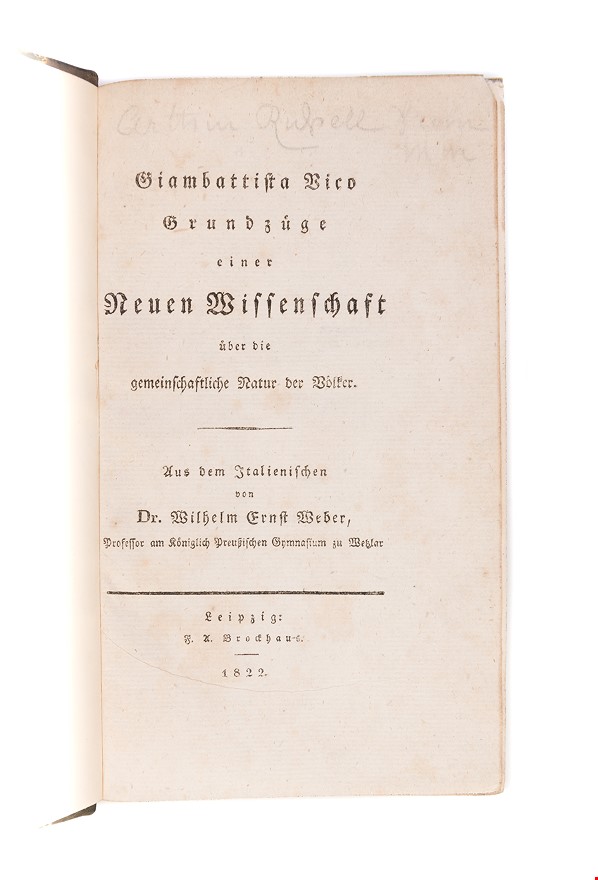Grundzüge einer Neuen Wissenschaft über die gemeinschaftliche Natur der Völker. Aus dem Italienischen von Dr. Wilhelm Ernst Weber.
VICO Giambattista (1822.)
£500.00 [First Edition]
Please contact us in advance if you would like to view this book at our Curzon Street shop.
First edition in German. 8vo. xxvi, [27]-118, 880 pp., folding letterpress table at rear. Some occasional marginal spotting. Later half green stained calf with marbled paper covered boards, spine with five single raised bands outlined in gilt and blind, second panel lettered in gilt in on red morocco label, speckled edges, marbled endpapers. Leipzig, F.M. Brockhaus.
The first German translation of La Scienza Nuova, the principal work by the Italian historian and philosopher Giambattista Vico (1668-1744), whose works were rediscovered in Germany by Herder and subsequently recognised as the beginning of the philosophy of history. The present German translation was undertaken by Dr. Wilhelm Ernst Weber (1790-1850) and was based on the third Italian edition revised by Vico and published in 1744 (the year of his death). The text is preceded by the translator's preface (dated 21 July 1821), a chronological list of Vico's works prepared by F. A. Ebert, and his autobiography (pp. [31]-118) with additions by the translator.
The Scienza Nuova was Vico's life's work; he continued to edit and re-edit it up until his death in 1744. Vico presented a groundbreaking treatise on the science of reasoning, in which he articulated a method for identifying 'universal forms of intelligibility common to all experience' (Costelloe) in the form of a history of civil society. Vico's system was a major departure from the then dominant Cartesian thought and established a theory of the development of civil society through key events: the progress of war and peace, law, social order, commerce and government. He asserted the existence of a shared human nature and a universal pattern according to which all nations run. This historical development is cyclical, Vico asserted, charting the progress of civil society from its earliest beginnings to its contemporary manifestation in seventeenth-century Europe. His temporal starting point is indicated in the 'Tavola Cronologica' that prefaces the first book, which compares early civil societies and their belief systems and anticipates his later assertion of different ages in civil development; the ages of gods and heroes, and the age of men.
Vico's work was 'largely neglected and generally misunderstood' in his own lifetime, perhaps due to his pessimistic idea of the inevitable decline of civilisation, in contrast to the optimism of contemporary enlightenment thinking about progress (PMM, 184). Yet 'Vico is now regarded as a highly original thinker who anticipated central currents in later philosophy and the human sciences. Twentieth century scholarship has established illuminating comparisons with the tradition of Hegelian idealism, and taken up the relationship between Vico's thought and that of philosophers of the Western tradition and beyond, including Plato, Aristotle, Ibn Khaldun, Thomas Hobbes, Benedict de Spinoza, David Hume, Immanuel Kant, and Friedrich Nietzsche. Comparisons and connections have also been drawn between Vichean themes and the work of various modern and contemporary thinkers, among them W.B. Yeats, Max Horkheimer, Martin Heidegger and Jurgen Habermas' (Costelloe).
Croce, Bibliografia Vichiana, p. 6; Ziegenfuss, Philosophen-Lexikon II, 783; PMM, 184 (Italian first edition, 1725).
Stock Code: 234392





